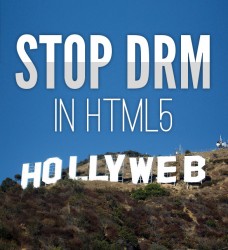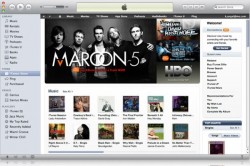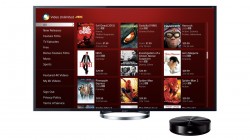I’m nearly through with my annual The Wire re-up, so I haven’t been watching much Netflix recently (as my bandwidth usage graphs will attest to). If you haven’t watched the show, I highly recommend it (just don’t give up until you’ve finished the first season, but I suspect you’ll be hooked around episode 6 or so, or it’s not the show for you). I don’t want to be one of those people that annoy others by evangelizing The Wire, but the show is so good that you feel others are missing out (and most that have been told about it have been “converted”, after the obligatory “nothing happens” statement after watching the first couple of episodes).
Oh yes, the WNR. Here we go.
![]()
For those lucky enough to get a pair of Google Glasses, here’s a tip: don’t wear them to the cinema unless you want to get interrogated by Homeland Security. What started out like one of those Internet tales that eventually gets disproved on Snopes has been confirmed to be totally true (by the theater chain, the MPAA and ICE), a story in which an Ohio man (and his wife) were pulled midway out of a viewing session, detained and questioned for more than an hour on the suspicion that his (turned off) Google Glasses were being used to record the movie.
This is despite the man explaining from the offset that the device had been turned off, and gave permission (or rather, pleaded) with the federal agent to check the contents on the Google Glass device and confirm that nothing had been recorded. The ICE Homeland Security agent was apparently asked to intervene in the matter by a MPAA rep present that day to monitor the screening of the popular (and popular piracy target) ‘Jack Ryan: Shadow Recruit’.
Instead, the man was interrogated for an hour and asked who he worked for, and funnily (although probably not to the man at the time), whether Google was employing him to record the movie. I know the MPAA (and by extension, ICE Homeland Security) has no love for Google , but this was a bit of a stretch.
For his troubles, the man and his wife were offered two free movie tickets by the MPAA rep by the MPAA rep so the couple could finally finish watching Shadow Recruit. Amazingly, The MPAA rep’s name was Bob Hope, a distant relative of the more famous Bob Hope (again, just to reiterate, this story is true). When the frustrated cinema patron, who only wanted an genuine apology instead of an explanation as to why he was targeted (due to the movie’s popularity, and the theater’s recent problems with piracy), did not seem placated by the two free tickets, two more free tickets were offered. The man was now infuriated.
You can read the entire description of the ordeal on The Gadgeteer website, where the story was first published. Scroll down to read the updates too, which includes confirmations from ICE Homeland Security of the incident.
Incidentally, a cam’d copy of Shadow Recruit made its way onto the usual places roughly around the same time. Presumably one now recorded on a Google Glass device. So the record for Shadow Recruit goes Pirates 1, MPAA 0, Poor Google Glass Guy (and his wife) -999.
![]()
The BDA, that’s the Blu-ray Disc Association, has approved plans to expand the Blu-ray specifications to include support for 4K UltaHD content. A task force consisting of 17 members, including Technicolor, Dolby, Fox, Disney and Sony, has been asked to come up with the final specifications for Blu-ray 4K. The changes could include more than just a larger capacity disc and a new video codec, and other improvements such as support for higher framerates could be introduced (finally allowing The Hobbit films to be shown in HFR 3D at home).
One of the proposed changes could see the introduction of 10, 12 and 16-bit deep color encodings. One company working on this claims to have developed an algorithm that allows for deep color encodings without an increase in bandwidth, and the finished output would also be backwards compatible. Studios would need to update their encoding technology, and Blu-ray players will also need to be updated to take advantage, but with the 4K specifications meaning changes are coming anyway, it might be a case of killing two birds with the same stone.
A disc based approach to 4K is still the best way to go for now, in my opinion. That’s not to say that streaming based 4K, which was a highlight of CES, doesn’t have its place. It’s certainly where Netflix thinks subscriber growth will come from in the future, although they seem to be doing quite alright even without 4K. A new shareholder report revealed Netflix’s total subscriber figure rose by 10% in the last three months of 2013 alone, with the company now having 44 million subscribers. I would gather the attention that original programming has garnered, via award nominations and wins, has contributed heavily to the growth figures. Despite the high cost of production of these shows, the investment appears to be well worth it, with net profit for the company up dramatically as well during the last quarter.
Netflix also commented on the recent Net Neutrality ruling. Netflix probably has the most to lose from the ruling, and the company is calling on ISPs to act responsibility. Netflix says ISPs should adopt a voluntary code of conduct on the matter, although they also believe that no ISP is stupid enough (in my words, not theirs) to do anything too “draconian” (their words, not mine). If ISPs start to get too “aggressive”, Netflix still wants the government to intervene via new regulations. You can read the shareholder report here.
Shameless plug time: Click here to sign up to Netflix, get a month long free trial and help me make a few bucks!
![]()
As promised last week, we take a slightly more detailed look at the NPD results for December in this week’s WNR, now that more numbers have been made available. As mentioned in the last issue, the Xbox One was the best selling non-portable console for the month (the best selling console being the DS, which sold over a million units). The PS4 was not that far behind though.
With 908,000 units sold compared to the PS4’s 860,000, the Xbox One did well to follow up on November’s 909,000 units sold – that’s 1.8 million in about five or six weeks of sales, which is not bad at all. Globally, the PS4 still has a comfortable sales lead though.
If we count the Wii U as a next-gen console, then its 480,000 units sold means it is in a distant third place against the the two powerhouses from Microsoft and Sony. 480,000 is still the Wii U’s best month ever, but Nintendo would have expected more sales, particularly with the company’s consoles having a history of being a popular gift idea in holidays past.
Data provided by Microsoft also showed that the Xbox 360 sold 643,000 units, far ahead of the PS3’s 299,000. The PS3’s low number can be explained by the smaller difference in pricing between it and Sony’s next-gen offering compared to the Microsoft offerings (the Xbox 360 was available for cheaper than the PS3, and competes with Microsoft’s own Xbox One, which is $100 more expensive than the PS4). It seems PS4 sales may be cannibalizing PS3 sales in a more dramatic way than the Xbox One is doing to the Xbox 360.
Regardless, sales of both of the older consoles seems to have more than halved compared to just a year ago, which is making game publishers worried about the continued viability of both platforms, according to analyst Michael Pachter. This is why Wedbush Securities’s Pachter believes a price cut could be coming for both the Xbox 360 and PS3 in February, a move pushed through by publishers concerned that holidays 2014 could be one where the Xbox 360 and PS3 are no longer relevant.
The good news, Pachter says, is that both Microsoft and Sony can afford a price cut due to the ever decreasing cost of manufacturing.
I think a price cut could be a good thing, but I don’t know if publishers are so concerned as to start “threatening” Sony and Microsoft for a price cut. There are already a hundred something million PS3s and Xbox 360s being owned by people right now, and I don’t see how adding a couple of extra million via a price cut will help the situation all that much. Besides, if people are abandoning their PS3/360 for a PS4/XB1, then that’s a good thing isn’t it? PS4/XB1 games will be more expensive, and so publishers should be able to make more money (assuming production costs are similar).
Surprisingly, here in Australia, prices have already started dropping (I say surprisingly because we seem to overpay for everything here). The lowest Xbox 360 price I’ve seen is $USD 130, $USD 165 for the PS3. So there’s definitely room for US pricing to drop.
And while there’s plenty of room left to write, I think I’ll end the WNR right here for this week. Have a great one, and talk to you again soon.












